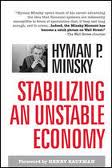 Stabilizing an Unstable Economyby Hyman Minsky
Stabilizing an Unstable Economyby Hyman Minsky
 Stabilizing an Unstable Economyby Hyman Minsky
Stabilizing an Unstable Economyby Hyman Minsky
An analogue of the BootleggersAndBaptists critique probably applies here. It seems like Keynes's General Theory came along at precisely the right time for someone in power to justify their actions.
Minsky lays out his extension of Keynes economic theory to include his capital structure (hedge, speculative, Ponzi) work, and recommends policy changes which, if his model holds, would reduce economic volatility. Although partially helped already by Diamond/Dybvig, he very much needs a Hicks to his Keynes.
First, the attenuation of the banking systems' base of equity; second, greater reliance on funds of a potentially volatile character; third, heavy loan commitments in relation to resources; fourth, some deterioration in the quality of assets; and, fifth, incrased exposure to the larger banks to risks entailed in foreign exchange transactions and other foreign operations.
Since the end of World War II, the banking system has evolved from the simplicity of the Treasury bill's monopoly as the position-making instrument to a complex situation in which a representative bank juggles its government-security account or its federal-funds position, has large denomination certificates of deposit, repurchase agreements, Eurodollar borrowings (or sales), and borrowings at the Federal Reserve...
The greater the number of alternative position-making techniques available for banks and for other financial institutions, the slower the reaction of the supply of finance to monetary policy of the Federal Reserve...
The likelihood that policy action will result in the economy going to the threshold of a financial crisis increases with the number of markets used for position-making, and with the proportion of bank assets bought through the various markets. Thus, as the financial system evolved over the postwar period, the potential for instability of the economy increased.
In the standard interpretations, Keynes has been integrated with classical theory to form what is called the neoclassical synthesis. Whereas Keynes in The General Theory proposed that economists look at the economy in quite a different way from the way they had, only those parts of The General Theory that could be readily integrated into the old way of looking at things survive in today's standard theory. What was lost was a view of an economy always in transit because it accumulates in response to disequilibrating forces that are internal to the economy. As a result of the way accumulation takes place in a capitalist economy, Keynes's 1935 theory showed that success in operating the economy can only be transitory; instability is an inherent and inescapable flaw of capitalism.
The typical professional bankk president is not a rich man when he starts his career. As a bank president he is a hired hand trying to a chieve a personal fortune. But given the tax structure, it is difficult to accumulate a fortune by saving out of income; the most efficient route for a business executive is by way of stock options and the capital gains that accrue as the stock market price per share rises...
If bank management can accelerate the growth rate of earnings by increaseing leverage without a decrease in the perceived security and safety of the bank's earnings, then the price of shares will rise because both earnings and the capitalization rate on earnings that reflects growth expectations rise. In a capitalist society with institutionalized organizations and tax laws such as ours, fortune-seeking by the managers of institutionalized enterprises leads to an emphasis on growth, which in turn leads to efforts to increase leverage. But increased leverage by banks and ordinary firms decreases the margins of safety and thus increases the potential for instability of the economy.
Furthermore, to decrease the instability-enhancing power of corporations, the bias favoring debt-financing due to high-rate corporate income taxes must be removed; the corporate income tax should be eliminated.(or eliminate the tax-deductibility of interest payments)
Over the past decades, although the geographical autonomy of banking has been eroded, the United States has not traveled far along the road that leads to a banking system dominated by a small number of giant banks. Even though the system remains decentralized, the banking laws and their administration should be structured to foster and encourage the growth and prosperity of independent, smaller banks. This is not the direction the current changes in bank regulation and bank legislation are taking.(can you tell this was written in 1986? ;)
Regulation and government intervention in markets are valid when they make markets behave as if they were competitive markets. Such intervention is necessarywhen market power exists or when other reasons lead to market failures.